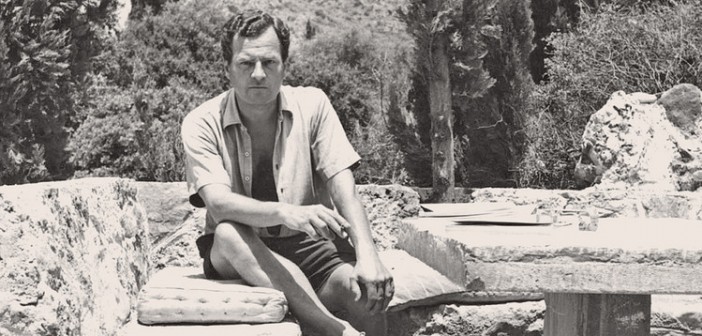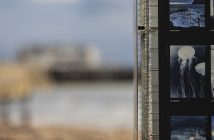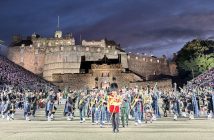Many who have read Patrick Leigh Fermor’s seminal travelogue have dreamed of retracing his walk through Europe. In 2011, Nick Hunt – himself from a line of spirited adventurers – finally undertook that momentous journey. And, here, we a delighted to offer the foreword and opening paragraphs of his own account of that odyssey, Walking the Woods and the Water…
In December 1933, eighteen-year-old Patrick Leigh Fermor set out in a pair of hobnailed boots to chance and charm his way across Europe, ‘like a tramp, a pilgrim or a wandering scholar’, on foot from the Hook of Holland to Istanbul. The books he later wrote about this walk, A Time of Gifts (1977), Between the Woods and the Water (1986) and the post- humous The Broken Road (2013), are a half-remembered, half-reimagined journey through cultures now extinct, landscapes irrevocably altered by the traumas of the twentieth century. The brilliant bubble of his writing captures a world of moccasin-shod peasants and castle-dwelling aristocrats, preserved in perfect clarity; at times his focus is so sharp the effect is hallucinogenic. But war, political terror and brutal social change lay on the horizon. That bubble was about to burst, and the raw light of the modern world would soon come flooding in.
I encountered these books when I too was eighteen, and they had a deep impact on me. On the simplest level, the narrative of a young man setting out to find his place in the world was something I identified with, because that’s what I was trying to do; I admired his guts, his panache, his inexhaustible delight, even if some of his fascinations – High Baroque architecture and the bloodlines of Europe’s noble families – were things I could hardly relate to. But the essential spirit of the books – the essential spirit of Paddy himself – sunk into my subconscious and never went away.
And that spirit had company there. The irresistible archetype of a wanderer in unknown lands first materialised in the figure of my great-uncle, mountaineer John Hunt, who led the first successful ascent of Everest in 1953. I had grown up on his tales, wondrously embellished over the years, of weird howls above the wind and yeti footprints in the snow around his tent. His house was crammed with souvenirs from a lifetime of adventures, and his antiquated climbing gear – cracked leather and polished wood, ludicrous-looking oxygen tanks, gloves the size of wellington boots – seemed like artefacts from an age of greater magic. As a child I accepted that he had been to the realm of gods, a pure and everlasting place far beyond man’s ordinary reach; rare adventurers such as him might be permitted to visit a while, but when they left, the mountain would return to its timelessness. The knowledge that such places existed – as secure as fairytales, or my own imaginary worlds – was deeply comforting.
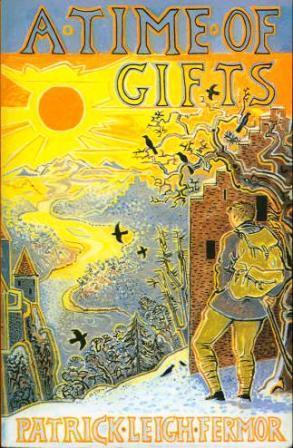 Paddy’s vision of an older, wilder Europe hooked me in a similar fashion. Before I’d finished reading the books, I knew with absolute certainty that one day I would follow in his footsteps, retracing his route through Holland, Germany, Austria, Slovakia, Hungary, Romania, Bulgaria and Turkey, in search of whatever was left of wildness and adventure. One passage from A Time of Gifts – spoken by an old polymath in Austria in 1934 – particularly haunted me: ‘Everything is going to vanish! They talk of building power-dams across the Danube and I tremble whenever I think of it! They’ll make the wildest river in Europe as tame as a municipal waterworks. All those fish from the East – they would never come back. Never, never, never!’
Paddy’s vision of an older, wilder Europe hooked me in a similar fashion. Before I’d finished reading the books, I knew with absolute certainty that one day I would follow in his footsteps, retracing his route through Holland, Germany, Austria, Slovakia, Hungary, Romania, Bulgaria and Turkey, in search of whatever was left of wildness and adventure. One passage from A Time of Gifts – spoken by an old polymath in Austria in 1934 – particularly haunted me: ‘Everything is going to vanish! They talk of building power-dams across the Danube and I tremble whenever I think of it! They’ll make the wildest river in Europe as tame as a municipal waterworks. All those fish from the East – they would never come back. Never, never, never!’
Those words articulated my quest. Had Europe been tamed? Had everything vanished? One day, I would walk until I found the answer.
The idea lay dormant for twelve years. Perhaps if I’d lived in a different time I might have set off there and then, but I came of age in an era of untaxed aviation fuel and limitless opportunities for travel; Europe, diluted – so I imagined – by the homogenising forces of modernisation and globalisation, would have to wait. Who wanted to visit Germany, when India was a short flight away? Why bother with the Rhine, when I could see the Ganges?
After a decade of jetting off to distant corners of the world, however, the instant gratification of flying began to lose its magic. I no longer enjoyed the sensation of being ripped out of time and place, of distance divorced from effort. I’d been to places remote and strange and gorged myself on the unknown, but I hardly knew a thing about the continent I lived in. That half-forgotten fantasy of following in Paddy’s footsteps swam back into focus, and as I reread the books, the impulse returned with urgency: I was almost in my thirties, and if I didn’t do it now, I probably never would.
The simplicity of walking – the essential humanness of putting one foot in front of the other – made a deep kind of sense. The more I thought about taking that first step, and following it with another, and another, the more fundamental it felt. What better way to know Europe than to expose myself to it completely, to be aware of each splatter of rain, each stone beneath my feet? How better to understand the processes of loss and change than to travel in the shadow of Paddy’s words? Above all, what better way to have an old-fashioned adventure?
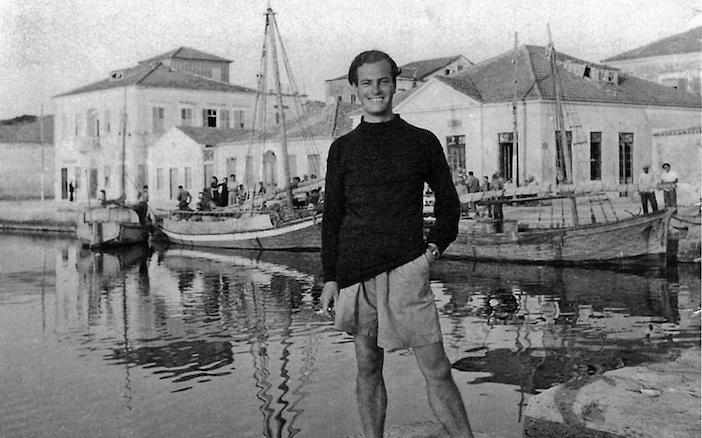
Once I had set a date – 9 December 2011, exactly seventy-eight years after Paddy started his walk – I prepared as little as possible. I stubbornly refused to train: walking, I decided, was an activity as natural as breathing, requiring no special preparation (this romantic optimism caused a lot of pain). It was important not to go as journalist, but journeyer; in an age of total information, I preferred to make my way in a spirit of wide-eyed discovery, to let the continent surprise me. For this reason, beyond buying roadmaps and putting out calls for accommodation, I deliberately did no research into where I was going. Paddy’s books, eight decades out of date, would be my only travel guide. With his experience underlying my own, I would see what remained of hospitality, kindness to strangers, freedom, wildness, adventure, the mysterious, the unknown, the deeper currents of myth and story I believed – or longed to believe – still flowed beneath Europe’s surface.
Six months before I started, Patrick Leigh Fermor died, at the age of ninety-six. For weeks, I’d been planning to send a letter to his home in Kardamyli, Greece, where generations of travel writers had gone to pay literary homage, to explain my reasons for following his road. I’d even written ‘Dear Paddy’ at the top of a sheet of paper, but hadn’t known how to go on. He was an extraordinary man – adventurer, war hero, bon viveur and raconteur – but my interest wasn’t biographical, and I wasn’t trying to cast myself as a modern-day version of him. It was his journey itself I was after, the contrast between his walk and my own; really, I’d simply wanted to tell him I was on my way. Now it was too late. The walk would have to be my letter. Through woods and water, wind and rain, fields, forests, cities, suburbs, mountaintops and motorways, I hope he would have approved.
******
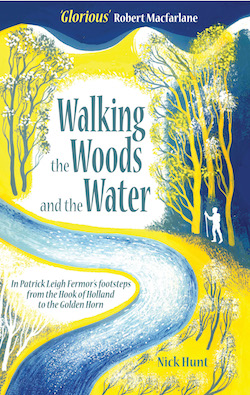 There was a rare black sky over London, a perfect moon above the streetlights; being able to see beyond the city, even if only directly up, made it feel like the right night to be starting. After posting my keys through the letterbox of the flat I was leaving for good, I christened my boots on Kingsland Road on the way to Hackney Wick, where my girlfriend Anna and her car were waiting. It was a walk I’d done countless times without ever needing to notice it, but the importance of this departure suffused the familiar sights with borrowed significance, making everything glow with a secret light. Past the steamed-up windows of Vietnamese noodleries, past kebab shops with their revolving meats, past grubby clusters of street drinkers squatting by cairns of empty cider cans, past smokers in skintight jeans conversing loudly about nothing outside bars in various stages of gentrification: the unremarkable sights of East London on a typical Friday night, which, as if through a stranger’s eyes, became remarkable.
There was a rare black sky over London, a perfect moon above the streetlights; being able to see beyond the city, even if only directly up, made it feel like the right night to be starting. After posting my keys through the letterbox of the flat I was leaving for good, I christened my boots on Kingsland Road on the way to Hackney Wick, where my girlfriend Anna and her car were waiting. It was a walk I’d done countless times without ever needing to notice it, but the importance of this departure suffused the familiar sights with borrowed significance, making everything glow with a secret light. Past the steamed-up windows of Vietnamese noodleries, past kebab shops with their revolving meats, past grubby clusters of street drinkers squatting by cairns of empty cider cans, past smokers in skintight jeans conversing loudly about nothing outside bars in various stages of gentrification: the unremarkable sights of East London on a typical Friday night, which, as if through a stranger’s eyes, became remarkable.
Paddy had left under torrents of rain from a different borough in a different age – ‘a thousand glistening umbrellas were tilted over a thousand bowler hats in Piccadilly’ – and three friends had accompanied him in a taxi to Tower Bridge, where a steamship called the Stadthouder Willem waited to depart. London’s wharfs had long since emptied, and no ships rode at anchor now, so Anna sped me from her warehouse flat to Harwich International Port to catch the eleven o’clock ferry across the North Sea. My only perception of that road was orange lights strobing past and, as we neared the port, long-distance Netherlandish trucks looming hugely in the night, emblazoned with phlegmy strings of vowels. Both of us sat in the limbo state that exists before a long parting, in which the course of normal conversation runs suddenly up against shocked silence when you remember why it is you’re actually in the car. Each silence was an overture to the physical distance ahead, notes of absence and longing filling the car with anticipatory sadness. A few hours later, Anna was no more than a tiny cone on matchstick legs, waving in a sodium-lit wasteland of parking lots and cranes. To her, I was just a smudge against the giant letter S of the Stena Hollandica, a ship so huge it may as well not have had a name.
The distance was too vast for shouting, so we said our goodbyes by mobile phone as the engines began to turn, churning the dock’s greasy water like a stirred-up sink. Static roared as the wind picked up, and seagulls rose and plunged against the skyscraper-high steel walls. Anna’s tiny form dissolved into the dirty grain of the quay, the frozen cranes and shipping containers rapidly became lost in darkness, and soon just a glow of light pollution was all that was left of England. Somewhere beyond the port, a fishing boat came bouncing over the water, the whoops of the lads on board carried on the wind: ‘You crazy bastard! Stupid fucker! Crazy son of a bitch!’
I didn’t take them personally, but it seemed these cries, and not my girlfriend’s words of love, would be my parting shot.

From my hip flask I took a nip of the whisky I’d bought in the last Turkish corner shop, but the wind was soon too cold to write, and I went inside with crabbed pink hands. No one else had ventured outside. When Paddy embarked on his voyage, 28,489 days before, he’d been the only passenger. Now bald men sat listlessly in front of pints or fruit machines, and children played in plastic pens of brightly coloured toys. I wandered through a labyrinth of duty-free shops and safety signs, past casinos, internet stations and gleaming canteens. I found my way to the C-View Bar and sat under a flatscreen television advertising Sacher Torte for €3.75. Jazz seeped from hidden speakers. White plastic Christmas trees twinkled on their wires.
Cabin number 10303 lay in a long corridor of identical doors. I spread the contents of my rucksack over the bunk and across the floor – warm clothes, waterproof clothes, sleeping bag, tin cup, A Time of Gifts and Between the Woods and the Water swaddled in plastic bags – before packing them back in as jumbled as before. At one o’clock I fell asleep, breathing processed air. The porthole was designed not to open, so the sound and the smell of the sea lay far outside my dreams. I woke at intervals in the night and gazed through the reinforced glass; first to see the full moon silvering the waves, and later distant structures lying far out across the North Sea, gantries with blinking red lights, their purpose mysterious. Soon after dawn I was roused by the opening chords of the reggae song ‘Don’t Worry, Be Happy’ coming from a speaker in the ceiling.
There were no immigration procedures to speak of. The sleepy-eyed passengers disembarked, a cavalcade of wheelie bags rumbling along the platform to board the Rotterdam train. I watched them go with a pleasantly abstracted feel- ing. I hadn’t talked to a soul on board, out of some superstition I couldn’t have explained, an instinct that told me a journey like this was best started quietly. The train pulled away, leaving me standing with a bitter wind stinging my face.
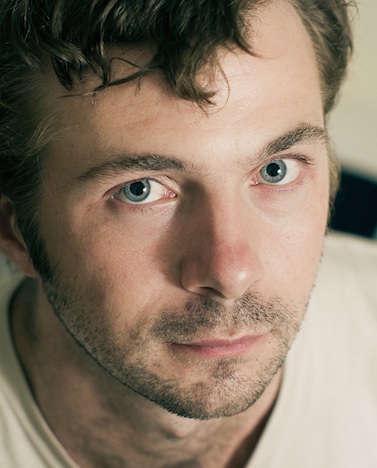 The sky above the Hook of Holland was massed with clouds, boiling banks of salmon and gold punctuated by luminous rays that poured down on the sea. Everything shone with a translucence that was indefinably different to any light that would fall on London. I took a few steps and then stopped, not knowing how to start. Standing at the edge of the car park, gazing at a green verge and watching the grasses shiver in the wind, I was filled with an unexpected reluctance to begin. All I had to do was walk. Surely it couldn’t be that simple? I felt there must be a catch, something I hadn’t considered.
The sky above the Hook of Holland was massed with clouds, boiling banks of salmon and gold punctuated by luminous rays that poured down on the sea. Everything shone with a translucence that was indefinably different to any light that would fall on London. I took a few steps and then stopped, not knowing how to start. Standing at the edge of the car park, gazing at a green verge and watching the grasses shiver in the wind, I was filled with an unexpected reluctance to begin. All I had to do was walk. Surely it couldn’t be that simple? I felt there must be a catch, something I hadn’t considered.
I might have continued standing there, staring idiotically, if not for the appearance of an old man with a bushy white moustache on a bicycle. ‘Goedemorgen,’ he nodded, ‘good morning’ – it may as well have been English – and clattered past me down a cycle path. It looked like vaguely the right direction, and after following for a minute I found a signpost to Rotterdam, 33 km, further than I’d expected. That arrow was all I required. It really was that simple. I put one foot in front of the other, and began to walk.
Walking the Woods and the Water is published by Nicholas Brealey and is available from Waterstone’s and all good bookshops.
Nick is appearing at the Henley Literary Festival on Wednesday 1 October 2014.

